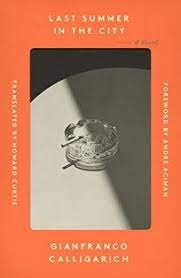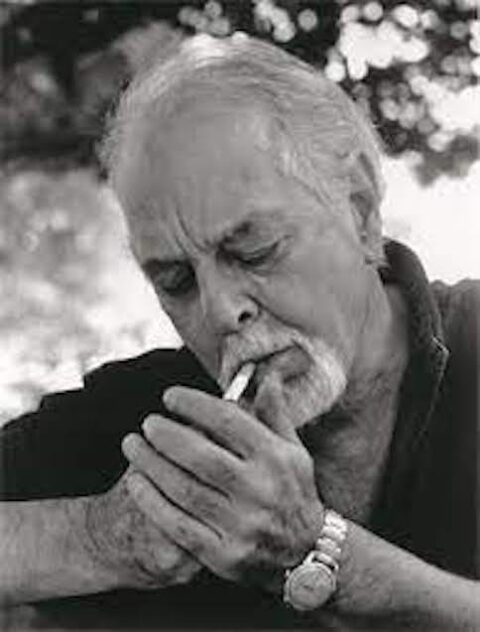“I’d come to the conclusion that it was better to stay on the sidelines and just observe life,” reports Leo on the first page of Gianfranco Calligarich’s remarkable 1973 novel, Last Summer in the City. He’s a Bartleby-like figure, but his passivity isn’t just an on-the-job protest. He’s turning 30, his mind lively and with no paralyzing trauma to speak of, but he can’t find his way into a job or relationship he cares about. Instead he spends his time in Rome, drinking and drifting. (Naturally, he thinks Under the Volcano makes a fine gift.) This lassitude isn’t uncommon among people his age, but Calligarich is exploring something beyond a failure-to-launch phase. Leo has explicitly decided never to launch, and the novel artfully blends the sense of fatalism and carefree attitude such a conclusion implies.
 Despite its publication nearly 50 years ago, Last Summer has only recently caught attention in Calligarch’s native Italy. (This is the first of his books to appear in English, translated by Howard Curtis.) As Andre Aciman explains in the foreword, the novelist Natalia Ginzburg was an early champion of Calligarich, but the book enjoyed only modest success upon publication. It took a couple of reissues in 2010 and 2016 for the book to finally find an enthusiastic audience there. Plainly nostalgia was part of the appeal. The obvious comparison point is Fellini’s La Dolce Vita, which follows a similarly wayward young journalist in Rome. Leo is unaffected by the wider world, and has enough money to allow himself to be buffeted by whatever predicaments he experiences: doing his job (poorly) at a sports newspaper, participating (poorly) in his friend’s scheme to script a movie financed by his wealthy American wife, pursuing a relationship (poorly) with a woman as unrooted as he is. He is surrounded by compatriots who seem to pursue diffidence as a lifestyle. “What people!” he smirkingly observes. “All they did was try to leave each other, but they were terrified of succeeding.”
Despite its publication nearly 50 years ago, Last Summer has only recently caught attention in Calligarch’s native Italy. (This is the first of his books to appear in English, translated by Howard Curtis.) As Andre Aciman explains in the foreword, the novelist Natalia Ginzburg was an early champion of Calligarich, but the book enjoyed only modest success upon publication. It took a couple of reissues in 2010 and 2016 for the book to finally find an enthusiastic audience there. Plainly nostalgia was part of the appeal. The obvious comparison point is Fellini’s La Dolce Vita, which follows a similarly wayward young journalist in Rome. Leo is unaffected by the wider world, and has enough money to allow himself to be buffeted by whatever predicaments he experiences: doing his job (poorly) at a sports newspaper, participating (poorly) in his friend’s scheme to script a movie financed by his wealthy American wife, pursuing a relationship (poorly) with a woman as unrooted as he is. He is surrounded by compatriots who seem to pursue diffidence as a lifestyle. “What people!” he smirkingly observes. “All they did was try to leave each other, but they were terrified of succeeding.”
Leo should be exasperating — or, at least, not be a full enough character to keep this short novel together. But his commitment to distancing himself from the world gives the novel a kick, merging a kind of empathetic thrill (who wouldn’t want to live off the grid like this for a bit?) with a tragic realism (how far can he actually take this?). And he has good company: His kinda-sorta lover, Arianna, juggles Leo with her sister’s ex-husband, a failing tennis pro, and she’s flighty enough to drive off with nothing but cigarettes, perfume, and a book by (of course) Proust. Across the summer described in the novel, their indirection adds up to a kind of charming forward motion; they’re not people making mistakes so much as making a romance out of their ineptitude. “We’ll meet secretly in tearooms until I find a very rich old lady, kill her, steal her jewels, and escape with you to Vienna,” he proposes. Hey, why not?
This works on the page — or at least doesn’t come off as absurd — because Calligarich matches his description of Leo’s vibrant gloom with a similar atmosphere in the city. Rome in the summer, as he describes it, seems forever prepared to give up on itself. “The city was so empty, you could hear the buildings growing old,” he writes after a churchyard concert ends and the plaza falls silent. After a long night out with Arianna, he notes “the buildings seemed to huddle over the sidewalks … night was slowly orientating itself toward dawn — it’s from three o’clock onward that night rises from its own abyss, dripping with dreams.” Over time, the crumbling, surreal mood evokes less Fellini than The Leopard or The Garden of the Finzi-Continis — stories about the old order slowly falling apart, with nothing emerging to replace it.
 Leo’s projection of his dissatisfaction upon the city is so thorough, knowing, and exquisitely turned that his disengagement is forgivable, even appealing. For a time, anyway. The sprightliness of Leo’s nothin’-matters-and-what-if-it-did posture darkens in the novel’s later stages, not because of any real triggering event; Calligarich suggests that futility is simply in the nature of things, carrying its own inertia. Early on, Calligarich spotlights the comedy in Leo’s attitude — hungover, he decides to “buy more aspirin and a few provisions, then shut myself in at home, determined not to go out until the world had apologized to me.” But weariness turns into contempt, exemplified by lecture from a friend so unusually fierce and sustained it’s effectively the book’s climax:
Leo’s projection of his dissatisfaction upon the city is so thorough, knowing, and exquisitely turned that his disengagement is forgivable, even appealing. For a time, anyway. The sprightliness of Leo’s nothin’-matters-and-what-if-it-did posture darkens in the novel’s later stages, not because of any real triggering event; Calligarich suggests that futility is simply in the nature of things, carrying its own inertia. Early on, Calligarich spotlights the comedy in Leo’s attitude — hungover, he decides to “buy more aspirin and a few provisions, then shut myself in at home, determined not to go out until the world had apologized to me.” But weariness turns into contempt, exemplified by lecture from a friend so unusually fierce and sustained it’s effectively the book’s climax:
“Is there anything you feel part of? No, there isn’t. And you know why there isn’t? Because we belong to an extinct species. We happen to still be alive, that’s all,” he said, stopping to light a cigar. Because, if I didn’t know, we were born just when beautiful old Europe was fine-tuning its most lucid, thorough, and definitive suicide attempt. Who were our parents? People who slaughtered one another on the battlefields of countries that no longer existed, that’s who they were. We were born between one furlough and the next, and the hands that had stroked our mothers’ loins were dripping with blood — not bad, as images go — or else we were the children of the old, the sick, the senile. The wrecked or the wreckers. We had the most fucked-up parents in history.”
That passage includes a trick Calligarich uses throughout the book. He often shifts from direct quotation to close third-person, turning dialogue into core description. Observation morphs into the novel’s reality, just as Leo’s fatalism eventually morphs into something actually fatal. Last Summer in the City is ultimately a melancholy novel, but one with a peculiar brightness to it. It makes a retreat from the world feel charming — that there’s a way out from the stress of the world, until, alas, there isn’t.
[Published by Farrar, Straus and Giroux on August 10, 2021, 192 pages, $25 hardcover]